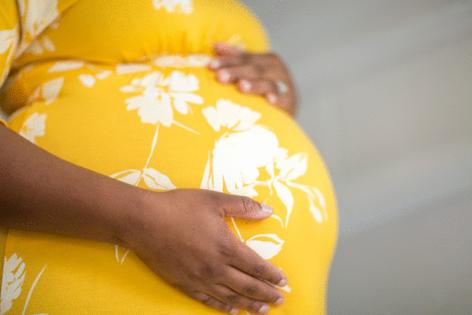She solved her heart problem. Then she learned her unborn baby had one
Published in Mom's Advice
Ashley Boyea had asthma, so she wasn't surprised when she got breathless at work. But when she began gasping for air just walking around, the then-25-year-old sales associate went to her pulmonologist for a checkup.
The doctor had her wear a heart monitor for a few days. It showed her heart was beating too fast. More testing revealed that, in addition to a rapid heart rate, she had sick sinus syndrome, a condition in which the heart's sinoatrial node is damaged and can't produce normal heartbeats.
First, Boyea tried to control it through medication. When that didn't work, her doctor suggested she see an electrophysiologist, or cardiologist specializing in heart rhythm disorders. This led to Boyea undergoing an ablation, a procedure that creates tiny scars in the heart to help break up the signals that cause irregular heartbeats.
Her irregular heart rhythm didn't improve, so she had a second ablation. In the days and weeks that followed, Boyea was so exhausted that she could barely function.
Her doctor suggested a pacemaker. The battery-powered device implanted in the chest helps regulate a person's heartbeat. Boyea got hers two months before her wedding. During the "I do's," it was only her fiancé, Ben Boyea, who made her breathless.
About three years after her wedding, Ashley found out she was pregnant.
Then, during a routine anatomy scan, she and Ben learned their baby had a problem with his heart – transposition of the great arteries, a massive plumbing issue. It's a rare congenital heart defect in which the two main arteries that leave the heart are reversed.
"Of all the heart conditions to have, this is a straightforward one," the doctor told the Boyeas. Just after birth, their baby would need an "arterial switch," or surgery to switch his pulmonary artery and aorta. The explanations helped put them at ease.
The Boyeas' local hospital in Plattsburgh, New York, wasn't equipped to care for a baby with the defect. Ashley was high-risk, too, because of her own heart issue.
So, the Boyeas regularly drove nearly three hours to a hospital in Albany for care, including monthly scans of the baby. Ashley also had to be close to the hospital well before her due date, just in case she went into labor early. Luckily, Ben's aunt and uncle lived in Albany, so she stayed with them.
Doctors decided to induce labor so they could better plan for the baby's surgery. After birth, baby Gabriel looked blue and lethargic.
Knowing he'd need immediate care, Ashley wasn't expecting to hold him. But a nurse placed Gabriel in her arms for a minute before whisking him off to the neonatal intensive care unit.
Gabriel underwent surgery at 6 days old. It was a success. After three weeks in the hospital, the Boyeas brought him home.
Like his mom, Gabriel, now 8, is doing well. He plays soccer and loves Legos. Both regularly visit a cardiologist.
"He's watched very closely," Ashley said. "We are nervous about him."
Ashley never learned the underlying cause of her electrical issue. Her doctor didn't think it was genetic. Even if it was, as an adoptee, Ashley didn't have any details about her birth family's health history.
Gabriel's heart issue didn't have an explanation, either.
"We were told this was just a fluke," Ashley said. "That it's not at all connected to me."
Ashley and Ben have two other healthy boys – Marcus, 6, and Joseph, 2. They had extra anatomy scans before birth, and their hearts looked OK.
Now, Ashley's pacemaker is nearing the end of its battery life, and she needs a new one. It's a challenge to balance scheduling the appointment – she has to drive to Albany to get it replaced – with taking care of her boys and the busyness of life.
"We're kind of in a health care desert where we live," she said. "There aren't enough doctors here, and we have to travel for our medical care. It means a lot of long drives."
Along the way, joining VT Cardiac Kids– a support group for kids with congenital heart defects – has helped the Boyeas navigate obstacles. Ashley and Gabriel attend events such as apple picking and baseball games. Ashley also speaks about heart disease to help dispel misconceptions.
"It's so important for people to understand that heart disease isn't just high blood pressure or cholesterol," she said. "It's also heart defects and rhythm issues."
____
Stories From the Heart chronicles the inspiring journeys of heart disease and stroke survivors, caregivers and advocates.
American Heart Association News covers heart and brain health. Not all views expressed in this story reflect the official position of the American Heart Association. Copyright is owned or held by the American Heart Association, Inc., and all rights are reserved.










Comments